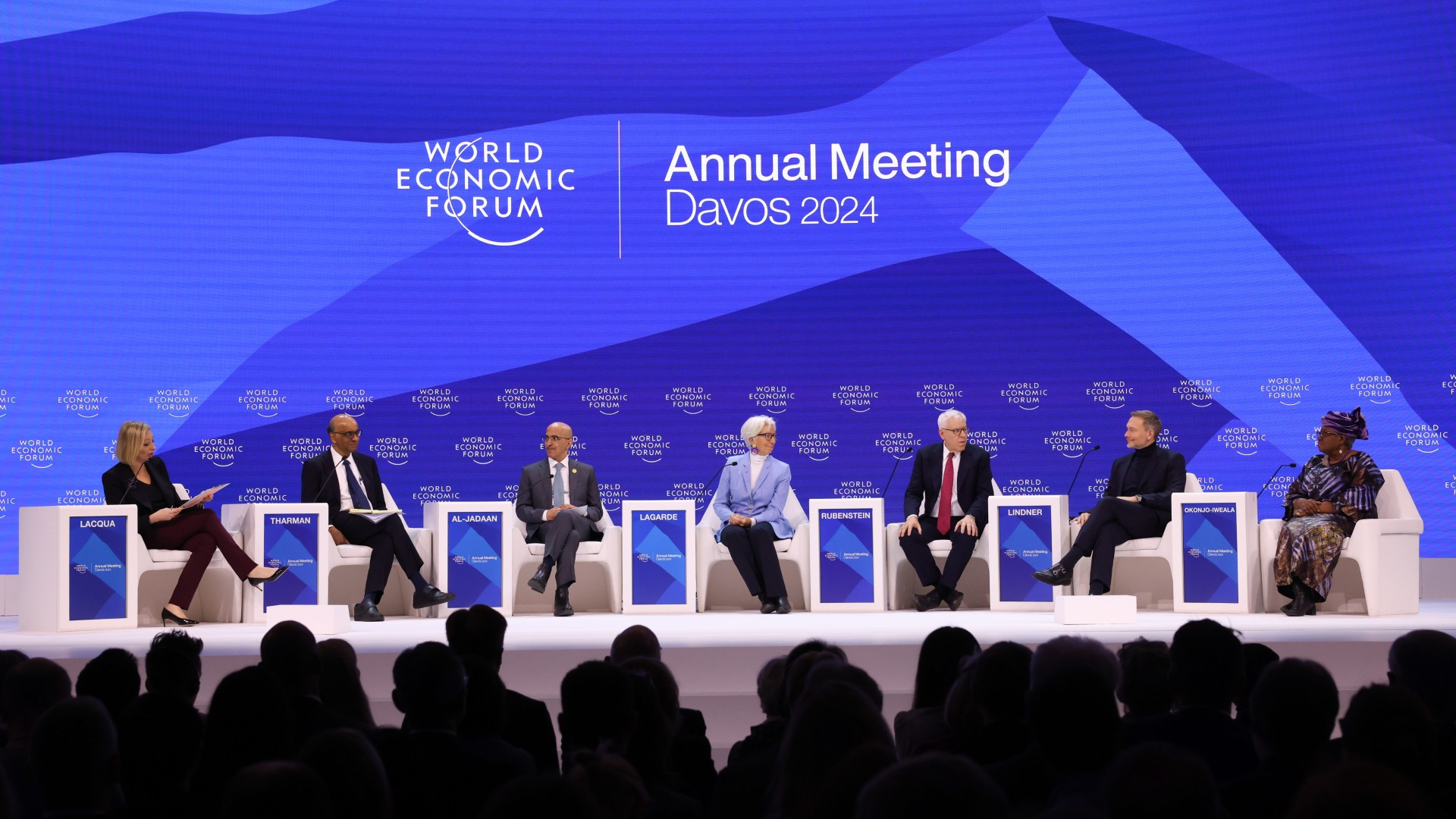Geopolitics and the economy in 2024
The West is banking on a year of falling inflation. Don't rule out a shock

A free daily email with the biggest news stories of the day – and the best features from TheWeek.com
You are now subscribed
Your newsletter sign-up was successful
The World Economic Forum at Davos was "the first barometer for global sentiment" at the start of a turbulent year, said Mehreen Khan in The Times.
The event was dominated by politics – particularly war in Ukraine and Gaza. In a departure from recent years, central bankers were "in short supply", said the paper's economics editor: only the European Central Bank president, Christine Lagarde, was scheduled to appear, while her counterparts from the US, Britain and Japan stayed away. Meanwhile, any complacency about inflation being vanquished in richer economies is beginning to look premature.
"After months of easing price rises", UK inflation unexpectedly rose to 4% in December, said Kate Beioley in the Financial Times. The culprit appears to be "a jump in tobacco prices after a recent duty increase". But it has revived concerns among economists about the potential impact of an external shock.
The Week
Escape your echo chamber. Get the facts behind the news, plus analysis from multiple perspectives.

Sign up for The Week's Free Newsletters
From our morning news briefing to a weekly Good News Newsletter, get the best of The Week delivered directly to your inbox.
From our morning news briefing to a weekly Good News Newsletter, get the best of The Week delivered directly to your inbox.
'Living in a new reality'
Worries centre on the disruption of a vital shipping route through the Red Sea by Houthi rebels in Yemen, used by 12-15% of global trade, said Dearbail Jordan on BBC Business. Major shipping firms are rerouting their vessels around Africa; but there's no reason to panic yet, according to Allianz's chief economic adviser, Mohamed El-Erian.
"In absolute terms" the disruption "is nothing compared to what we had in 2021 and 2022" when Covid disrupted shipments, he said. But the situation is still precarious. "We are living in a new reality where the supply side of the global economy is much more fragile, which means inflationary tendencies are greater than they used to be."
Similar uncertainty is swirling around the oil price, said Brian Swint on Barron's. Brent crude is up by more than 2% since the start of the year but has remained relatively stable at around $79/barrel. Conflicting factors are in play.
"Worries about attacks on tanker ships in the Red Sea" have so far been trumped by wider concerns about weakening global energy demand. That could easily change.
A free daily email with the biggest news stories of the day – and the best features from TheWeek.com
'Feelgood factor'
"Everyone has a plan until they get punched in the face," as the boxer Mike Tyson once noted. The prime minister should bear that in mind as he ponders when to hold the next election, said Liam Halligan in The Sunday Telegraph.
Rishi Sunak plans to wait as long as possible "in the hope repeated rate cuts and a steady easing of the cost-of-living crisis" throughout 2024 will create a "feelgood factor", said Halligan, also the economics and business editor of GB News.
But there's a growing risk of being punched in face by geopolitics. The spread of conflict to the Strait of Hormuz – the route for around 25% of hydrocarbons used daily and "the windpipe of the global economy" – could prove a real "pinchpoint". The international risks have risen significantly – "and could soon upend British politics".
-
 The ‘ravenous’ demand for Cornish minerals
The ‘ravenous’ demand for Cornish mineralsUnder the Radar Growing need for critical minerals to power tech has intensified ‘appetite’ for lithium, which could be a ‘huge boon’ for local economy
-
 Why are election experts taking Trump’s midterm threats seriously?
Why are election experts taking Trump’s midterm threats seriously?IN THE SPOTLIGHT As the president muses about polling place deployments and a centralized electoral system aimed at one-party control, lawmakers are taking this administration at its word
-
 ‘Restaurateurs have become millionaires’
‘Restaurateurs have become millionaires’Instant Opinion Opinion, comment and editorials of the day
-
 Epstein files topple law CEO, roil UK government
Epstein files topple law CEO, roil UK governmentSpeed Read Peter Mandelson, Britain’s former ambassador to the US, is caught up in the scandal
-
 Iran and US prepare to meet after skirmishes
Iran and US prepare to meet after skirmishesSpeed Read The incident comes amid heightened tensions in the Middle East
-
 Israel retrieves final hostage’s body from Gaza
Israel retrieves final hostage’s body from GazaSpeed Read The 24-year-old police officer was killed during the initial Hamas attack
-
 China’s Xi targets top general in growing purge
China’s Xi targets top general in growing purgeSpeed Read Zhang Youxia is being investigated over ‘grave violations’ of the law
-
 Panama and Canada are negotiating over a crucial copper mine
Panama and Canada are negotiating over a crucial copper mineIn the Spotlight Panama is set to make a final decision on the mine this summer
-
 Why Greenland’s natural resources are nearly impossible to mine
Why Greenland’s natural resources are nearly impossible to mineThe Explainer The country’s natural landscape makes the task extremely difficult
-
 Iran cuts internet as protests escalate
Iran cuts internet as protests escalateSpeed Reada Government buildings across the country have been set on fire
-
 US nabs ‘shadow’ tanker claimed by Russia
US nabs ‘shadow’ tanker claimed by RussiaSpeed Read The ship was one of two vessels seized by the US military